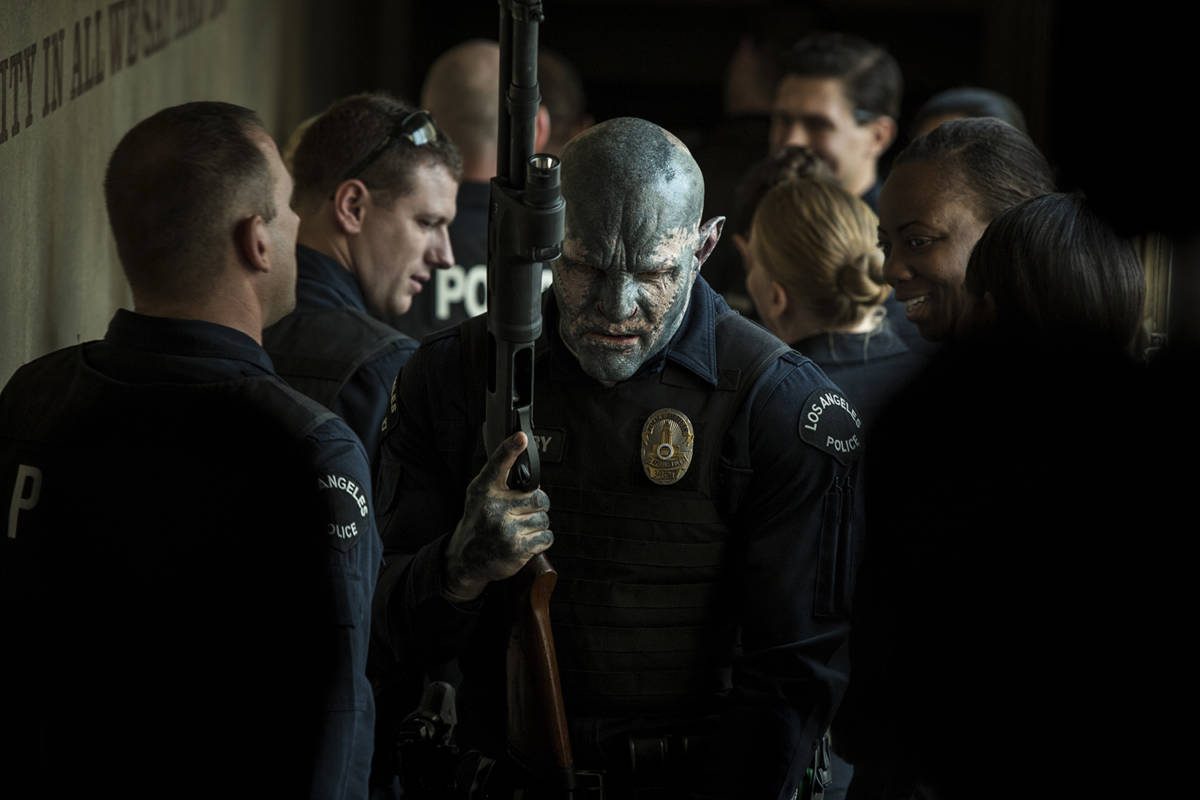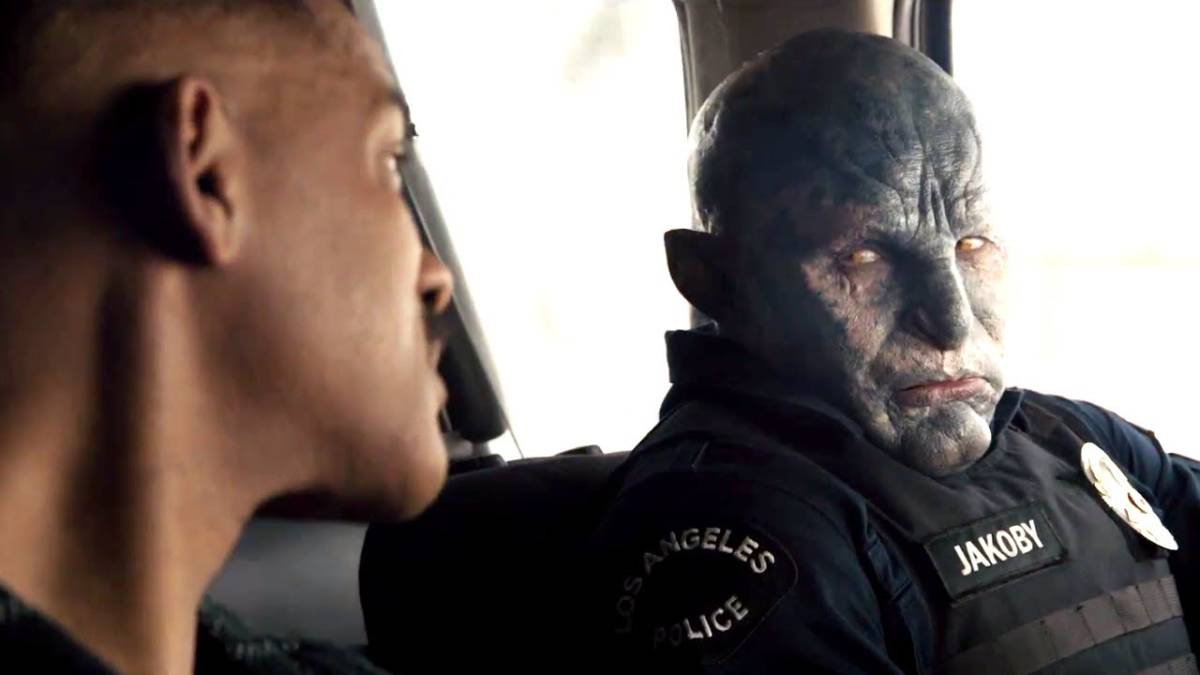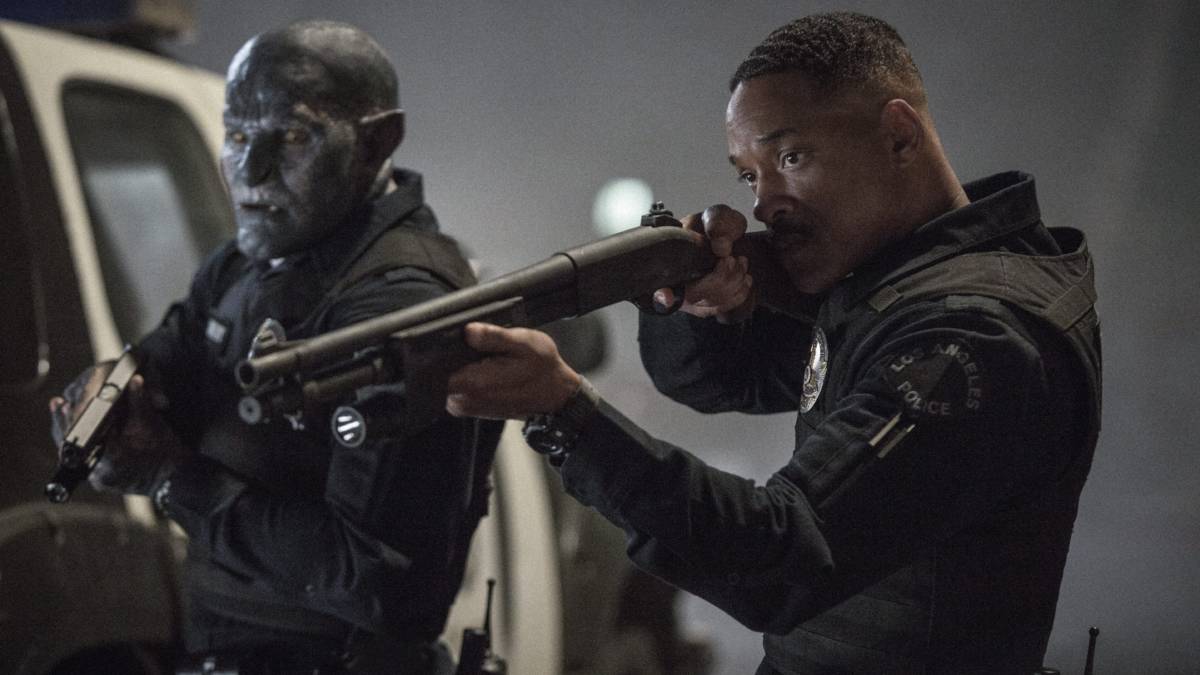Bright had potential. In an increasingly overcrowded and unimaginative blockbuster market its premise of goofy fantasy/cop drama mixed with social satire promised something that would be, at the very least, fresh and interesting. Sadly, this promise went unfulfilled. Released earlier this year to resoundingly negative reviews – although as David Ayer, Bright’s director, was quick to remind us, fairly high audience scores, too – the final product managed to be confused, generic, offensive, stupid, and deeply frustrating all at once; its creators somehow managing to develop the most unimaginative expressions of its most imaginative concepts while at the same time failing, spectacularly, to even attempt to explore any of the themes built into its premise. Most galling of all, though, is the fact it’s delivered with the smug satisfaction of a precocious twelve-year-old who thought simply turning up with a cool idea would substitute actually doing the homework.
To begin with, however, there is the admittedly intriguing premise. Introduced in the title sequence (a montage of graffiti murals that probably looked better on the page than it does on film), Bright imagines a world where something akin to Lord of the Rings happened 2000 years ago – orcs, elves, dark lord, etc. – but after the great war, life simply went on. The question the film asks is: What would that world look like today? How would the races organise themselves? What would it be like to actually live in this world? It’s an undeniably interesting concept, rich in possibility. Inherently silly, of course, but if done with earnestness and depth it could be great.
We are in contemporary LA, a deeply divided city where the Orcs have become an underclass, Elves live in the plush, high-rise ‘Elf-Town’ (in which they spend their time ‘running the world and shopping’), and humans are trying to get along somewhere in the middle. Why, you might ask, does this world look exactly like our own with a few races added in, rather than a vastly different world altogether? One has to grant some artistic licence, of course, but in this case it’s an ominous sign of things to come. We are introduced to Ward, a beat cop played by Will Smith, and Jakobi (Joel Edgerton), the first Orc ever admitted to the police force. Ward and Jakobi, despite differing races, competency, and personalities are paired up together; and wouldn’t you just know it, they come to respect and trust each other over the course of one crazy night.
To be more specific, that crazy night sees them called to a disturbance which, as it turns out, is a grisly magic-aided massacre (which, to be fair, is realised pretty well). It is there that they find a magic wand, which is wanted by a variety of different groups with generally shady plans for its use. Needless to say, Ward and Jakobi go on the run with these groups in hot pursuit and light fantasy action ensues. If that sounds to you like a fairly generic action pursuit movie set-up, congratulations, you are entirely correct in your assumption. That’s not an issue in and of itself, but when a concept this fresh has been made to feel this generic, it feels like a huge missed opportunity. Honestly, when the action gets going, it really feels like it could be any vaguely fantasy action movie – right down to the presence of Will Smith and the evil elves who, with their kung-fu moves and leather coats, look more like cast-offs from an unmade Matrix sequel rather than anything specific to Bright’s universe.
One of the only interesting permutations of its concept is the fact that Orcs still face hatred and distrust because they sided with the Dark Lord 2000 years ago. Thus, they face discrimination and resentment in all walks of life and get charming names like ‘pig-face’ thrown at them. I say ‘one of the only interesting permutations of the concept’ because the film suffers from a chronic inability to expand on any of the ideas it throws up. It constantly gives us little elements that seem initially cool; yet the lack of follow through on any of them completely negates their effect. For example, we see a centaur cop at one point involved in the brutal assault of an orc, only to never see another centaur – does this world have different toilet facilities for centaurs? Do they have special road lanes on which they can trot down?
The film also implies that elves, through their closer relationship with magic, have come to essentially rule the world (going so far as to have their own guarded high-rise district in LA). Would it not have been interesting to actually see how this works, or to give us some sense of internal elf politics? At another point we briefly see the silhouette of a dragon flying lazily across the sky in an establishing shot. How does this world deal with the threat of fire breathing monsters flying freely? We never know because the film doesn’t care to show us. One can, of course, make the case that little, unexplored details can enhance the verisimilitude of the world by giving us just enough to let our imaginations fill in the rest. Indeed, some of cinema’s best moments have come from exactly this kind of thing – ‘I watched c-beams glitter in the dark near the Tannhäuser Gate’ – yet what Bright seems to misunderstand about this idea is that it’s not interesting or exciting for an audience to see what should be major details of the world relegated to blink-and-you-missed-it moments. Frankly, it feels like a cheat more than anything. But it all leads back, I think, to the aforementioned sense that the film’s creators thought that simply having an idea substitutes actually thinking about how it fits into this world.
In its handling of magic, however, the film fares a little better. In this world, magic is heavily regulated by the Magic Task Force (the magic analogue of the FBI, I suppose), so much so that magic has become almost mythical, a scary bed time story for the kids. I like and believe the idea that magic would be made into a myth by the powers that be; and the faint implication that the world is dominated by elite magic users is an intriguing one. The wand that the film’s action is centred around, too, is an interesting take on what magic would actually be like in the real world. No longer the quaint little wooden sticks of the popular imagination, Bright’s wand glows blue and shakes with raw power, merely touching it can make one explode. But even here, Bright’s familiar issues rear their ugly head. Considering it’s ‘a nuclear weapon that grants wishes’ – a clunker of a line in a film that already has a few (See also: ‘If you act like my enemy, you become my enemy’) – we see next to none of the zany possibilities that might entail the use of such a weapon. In fact, beyond a few obligatory chumps touching the wand – with the expected result – we only see the wand used twice, and even then, it’s in the dullest and most expected fashion possible.
You may have read the aforementioned descriptions of racial tension between orcs and humans and thought, Hey, it sounds like this movie’s making a Point. That would certainly be the fair assumption. Indeed, the film certainly seems like it’s making a vague and directionless swing at saying something – it’s just entirely unclear what it is it’s trying to say. If, as the film clearly implies, orcs are meant to be an analogue for African Americans, what are we to make of a scene where, upon watching an orc being brutally beaten by some policemen, Ward angrily asks Jakobi ‘are you a cop first or an orc first?’ And then there’s the scene where Ward crushes a fairy (in this world more akin to a domestic nuisance like a racoon) and then utters the immortal words ‘fairy lives don’t matter today.’ Beyond the initial amazement that someone clearly thought this wasn’t possibly the most tone-deaf moment ever put on film – I mean, seriously, who looked at this on the page and OK’d it? – it further muddies any point the film is trying to make. And the most interesting question that could be raised about the film’s world – how do the presence of orcs and elves affect relations between human races – is never touched upon, at all. We’re simply meant to assume, I think, that humans have got over their differences now that they have orcs to hate instead. This is where the film’s intentions come to appear almost insidious (humans would get on fine if there was something else to focus their hatred on!). But that would be giving it too much credit – it would suggest that the film had something to say, however murky and undefined that point may be. But the sad truth, really, is that the film has nothing to say; its creepier implications are the result of ignorance more than ill-intention. What may at first appear to be social commentary is instead an empty, soulless appropriation of it, which, with every passing joke, further unmasks its laughable vapidity at its core.
My friend and fellow viewer said as we were watching that this is an idea much better suited to a TV series, and he was right. While a lot of the issues I’ve raised are the fault of creative missteps specific to the movie’s realisation of this world, the fact that it’s a film means the time to explore this world is extremely limited. If you really want to explore this world (as the film would initially suggest it does), wouldn’t a Wire-style show that deeply examined the interplay between races serve better than the superfluous treatment it gets here? But I suppose that’s getting into hypotheticals (and that dangerous critical game of simply projecting what one would rather see than looking at the work’s own merits). However, even with that said, Bright could have done much better with the short time that it does have. Despite its problems, a strong emotional centre could have ameliorated some of its issues. But, sadly, we have Ward and Jakobi. Will Smith plays Will Smith, which is fine, I suppose; he’s always watchable, even when on autopilot as he is here – but being watchable doesn’t necessarily equate to an interesting character, and Max Landis’s script doesn’t give him anything interesting to do (other than a baffling ‘You are the One’ moment at the end which has absolutely no build up or sense of payoff – indeed, it leaves one with the strong suspicion that Will Smith has “Must be the Chosen One” written into all of his contracts). The unrecognizable Joel Edgerton fares better playing an orc torn between his race and his sense of justice and duty (and in some strange way one has to respect the almost masochistic number of hours he must have spent in a make-up chair). But, ultimately, the central relationship just doesn’t have anywhere near the charm or chemistry needed to carry the film. By the time their big emotional moment together rolls around, one is so bored and numbed by the preceding action that it loses any impact it might have had.
But why, you might ask, does it matter than Bright sucked? Well, firstly, it’s abundantly clear the opportunity has been missed so badly as to be actively frustrating. Make no mistake, it’s really a terrific premise – the potential for an interesting, relevant, and exciting movie was there. David Ayer is a hugely competent action director and macho, LA-set buddy cop drama is something of a specialty for him, having made End Of Watch and Training Day (and the unrelated but equally excellent Fury).
But, thinking about it now, perhaps having a script by Max Landis should have alerted us sooner than it did. Son of writer and director John Landis, young upstart screenwriter Max has carved out a hugely successful career despite consistent box office failure and deeply obnoxious public persona – and, more worryingly, a long string of sexual assault allegations that, in this post-Weinstein era, makes his continued employment ever more inexplicable. But, if you can say anything for his movies, it is that he has made a point of trying to subvert your expectations. And while it’s certainly true that my expectations were subverted here, it was only in the worst possible sense. What we have here is a deeply generic movie where, yes, you can see some elves killed with shotguns, but shockingly little else of genuine interest. But what elevates it to true intolerability – and makes it impossible to be enjoyed even as trashy entertainment – is the fact that its purported big ideas about race and society are brainless, hollow, and, most damningly, completely cynical. When a film implies it has something to say, it’s reasonable to expect that they actually have to courage and intelligence to do so. It’s one thing to not achieve your cinematic objective; it’s another entirely to not try at all. And to be as muddy and directionless as Bright is in its racial and social politics leaves one not only feeling short changed but mildly humiliated that its creators think us this dense.
Needless to say, a sequel has already been commissioned. Let’s hope we finally get an answer on those Centaur toilet facilities.
Some of the coverage you find on Cultured Vultures contains affiliate links, which provide us with small commissions based on purchases made from visiting our site.



